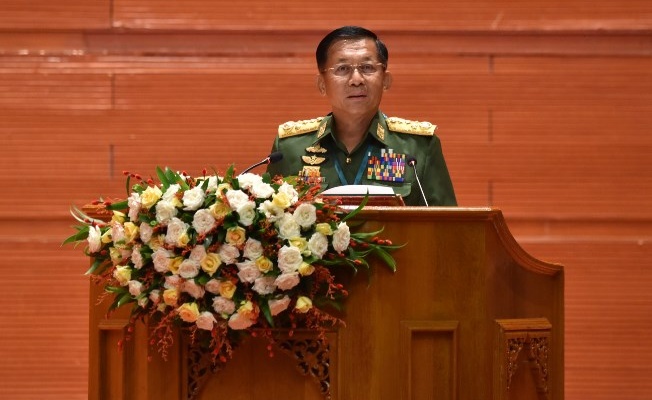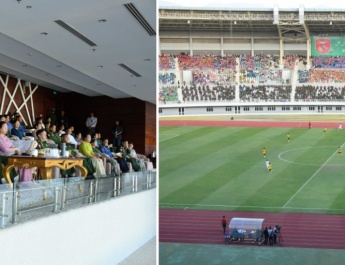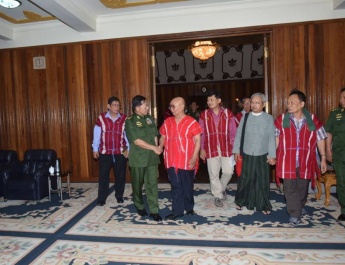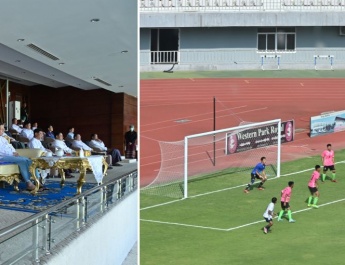နေပြည်တော်၊ ဩဂုတ် ၁၉
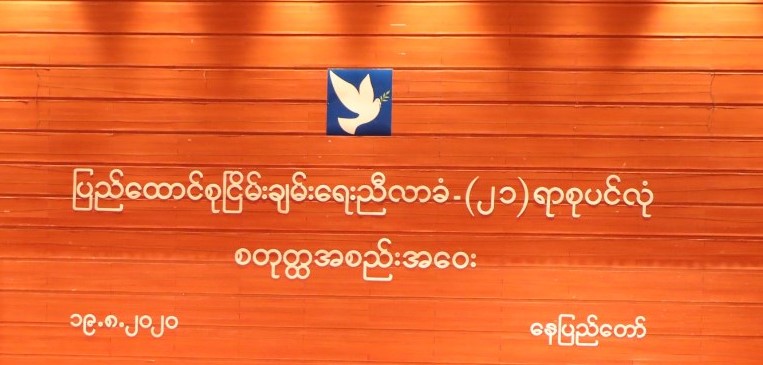
ပြည်ထောင်စုငြိမ်းချမ်းရေးညီလာခံ-(၂၁)ရာစုပင်လုံ စတုတ္ထအစည်းအဝေးသို့ တက်ရောက်လာကြတဲ့ နိုင်ငံတော်အစိုးရမှ တာဝန်ရှိသူများ၊ အမျိုးသားပြန်လည်သင့်မြတ်ရေးနဲ့ ငြိမ်းချမ်းရေး ဗဟိုဌာနကတာဝန်ရှိသူများ၊ တိုင်းရင်းသားလက်နက်ကိုင်အဖွဲ့အစည်းအသီးသီးမှ တာဝန်ရှိသူများ၊ အစုအဖွဲ့အသီးသီးက ကိုယ်စားလှယ်တော်ကြီးများ၊ နိုင်ငံတကာအဖွဲ့အစည်းများနဲ့ နိုင်ငံအသီးသီးမှ သံအမတ်ကြီးများ၊ ကိုယ်စားလှယ်များအားလုံး နှလုံးစိတ်ဝမ်း ငြိမ်းချမ်းကြပါစေလို့ နှုတ်ခွန်းဆက်သ ဆန္ဒပြုအပ်ပါတယ်။
ယခုကျင်းပပြုလုပ်တဲ့အခမ်းအနားဟာ စတုတ္ထလို့ဆိုသော်လည်းပဲ ပါတီစုံဒီမိုကရေစီစနစ်၊ ယခင်အစိုးရလက်ထက်လုပ်ခဲ့တဲ့ ပြည်ထောင်စုငြိမ်းချမ်းရေးညီလာခံနဲ့ပါဆိုရင် ပဉ္စမအစည်းအဝေးဖြစ်ပါတယ်။ အစိုးရနဲ့ တိုင်းရင်းသားလက်နက်ကိုင်အဖွဲ့အစည်းများ (EAO)များ စုံစုံလင်လင် တွေ့ဆုံဆွေးနွေးခဲ့တာကို ထည့်သွင်းမှတ်တမ်းပြုကြမယ်ဆိုရင်တော့ ၁၉၆၃ ခုနှစ် တော်လှန်ရေးကောင်စီလက်ထက်မှာ KNU ပါတီ၊ မွန်ပြည်သစ်ပါတီ၊ ကရင်နီအမျိုးသားတိုးတက်ရေးပါတီ စတဲ့ အမျိုးသားဒီမိုကရေစီညီညွတ်ရေးတပ်ပေါင်းစု(မဒညတ) ၃ ပါတီနဲ့ ဗမာပြည်ကွန်မြူနစ်ပါတီတို့နဲ့ တွေ့ဆုံဆွေးနွေးခဲ့တဲ့အတွက် အခုအစည်းအဝေးဟာဆဋ္ဌမအကြိမ်လို့တောင် ဆိုရပါလိမ့်မယ်။
ကျွန်တော်တို့နိုင်ငံဟာ ၁၈၈၅ ခုနှစ် လွတ်လပ်ရေးမဆုံးရှုံးမီအထိ ဘုရင်စနစ်ကျင့်သုံးခဲ့တဲ့ နိုင်ငံဖြစ်ပါတယ်။ ဗမာဘုရင်၊ ရခိုင်ဘုရင်၊ မွန်ဘုရင်စတာတွေရှိခဲ့သလို တောင်တန်းဒေသတွေမှာ ကချင်ဒူဝါးတွေ၊ ရှမ်းစော်ဘွားစတာတွေလည်း ရှိပါတယ်။ ကျွန်တော်တို့ တိုင်းရင်းသား ပြည်သူလူထုအားလုံးရဲ့စည်းလုံးမှုနဲ့ ပထမမြန်မာနိုင်ငံတော်(ပုဂံခေတ်)၊ ဒုတိယမြန်မာနိုင်ငံတော်(တောင်ငူခေတ်)၊ တတိယမြန်မာနိုင်ငံတော် (ကုန်းဘောင်ခေတ်)တို့ကို စုစည်းတည်ထောင်နိုင်ခဲ့ပါတယ်။ အင်္ဂလိပ်တို့ အနေနဲ့ မြန်မာနိုင်ငံကို ကျူးကျော်စစ်သုံးကြိမ်ဆင်နွှဲပြီး ၁၈၂၄ ခုနှစ် မှာ ရခိုင်-တနင်္သာရီဒေသ၊ ၁၈၅၂ ခုနှစ်မှာ အောက်မြန်မာနိုင်ငံနဲ့ ၁၈၈၅ ခုနှစ်မှာတော့ တစ်နိုင်ငံလုံးကို သိမ်းပိုက်ခဲ့ပါတယ်။ နယ်ချဲ့တွေက မြန်မာနိုင်ငံကို သူတို့ရဲ့ အင်ပါယာလက်အောက်ခံနိုင်ငံအဖြစ် သွတ်သွင်းပြီးကတည်းက မြန်မာ့လွတ်လပ်ရေးဆုံးရှုံး ခဲ့ရသလို ဘုရင်စနစ်အုပ်ချုပ်ရေးဟာလည်း နိဋ္ဌိတံခဲ့ပြီးဖြစ်ပါတယ်။ သွေးခွဲအုပ်ချုပ်မှုကို ပုံဖော်တဲ့အနေနဲ့ နယ်ချဲ့တွေက တောင်တန်းဒေသတွေမှာ ယခင်ကရှိခဲ့တဲ့ စော်ဘွားအုပ်ချုပ်ရေးစနစ်၊ ဒူဝါးအုပ်ချုပ်မှုပုံစံ စတာတွေကို ၎င်းတို့ရဲ့ အပြည့်အဝ ကြီးကြပ်မှု အောက်မှာထားခဲ့တာကိုလည်း သတိချပ်စေလိုပါတယ်။ ဒါတွေဟာလည်း မြန်မာနိုင်ငံ လွတ်လပ်ရေးရရှိပြီး ၁၉၅၉ ခုနှစ် ကတည်းက ပြီးဆုံးခဲ့ပြီးဖြစ်ပါတယ်။
ကျွန်တော်တို့နိုင်ငံဟာ ကိုလိုနီခေတ်မှာ ဒိုင်အာခီအုပ်ချုပ်ရေး၊ ၉၁ ဌာနအုပ်ချုပ်ရေးစတဲ့ အုပ်ချုပ်ရေးစနစ်ပေါင်းစုံနဲ့ ကြုံတွေ့ခဲ့ရပြီး ၁၉၄၈ ခုနှစ် လွတ်လပ်ရေးရပြီးခေတ်မှာ ပါလီမန်ဒီမိုကရေစီ စနစ်ကို ကျင့်သုံးခဲ့ပါတယ်။ ၁၉၅၈ ခုနှစ်၊ ၁၉၆၂ ခုနှစ်မှာ အိမ်စောင့်အစိုးရ၊ တော်လှန်ရေးကောင်စီအစိုးရတို့ အုပ်ချုပ်ခဲ့ပြီး ၁၉၇၄ ခုနှစ်မှ ၁၉၈၈ ခုနှစ်အထိ မြန်မာ့ဆိုရှယ်လစ်လမ်းစဉ်ပါတီ အစိုးရက ဆိုရှယ်လစ်စနစ်ကို ကျင့်သုံးအုပ်ချုပ်ခဲ့တာဖြစ်ပါတယ်။ ၁၉၈၈ ခုနှစ် ဒီမိုကရေစီအရေးလှုပ်ရှားမှုများနဲ့အတူ ပေါ်ပေါက်လာတဲ့ မငြိမ်သက်မှုများကြောင့် ၂၀၁၀ ပြည့်နှစ်အထိ နဝတ၊ နယက အစိုးရ များက အုပ်ချုပ်ခဲ့ပြီး ပြည်သူလူထုတောင့်တတဲ့ ပါတီစုံဒီမိုကရေစီစနစ်ကို ဖော်ဆောင်နိုင်ရေး အခြေခံအုတ်မြစ်များ ဆောင်ရွက်ပေးခဲ့ပါတယ်။ ၂၀၁၀ ပြည့်နှစ်ကနေ ယနေ့အထိ ပြည်သူ့ဆန္ဒနဲ့အညီ ပါတီစုံဒီမိုကရေစီစနစ်ကို ကျွန်တော်တို့ကျင့်သုံးလျက်ရှိနေပါတယ်။ ဒါတွေကို ကျွန်တော် ပြန်ပြောင်းပြောနေရတာကလည်း ကျွန်တော်တို့နိုင်ငံရဲ့ အုပ်ချုပ်ရေးစနစ် ပြောင်းလဲလာမှုအဆင့်ဆင့်ကို သတိပြုနိုင်ဖို့ဖြစ်ပါတယ်။
ဒီနေ့ကမ္ဘာမှာ ဘုရင်စနစ်အုပ်ချုပ်တဲ့ နိုင်ငံအချို့ရှိနေသေးသော်လည်း ယခင်ကျင့်သုံးခဲ့တဲ့ပုံစံနဲ့ များစွာခြားနားပြီး အကန့်အသတ်နဲ့သာ ထားရှိနေတာ တွေ့ရပါလိမ့်မယ်။ ကျွန်တော်တို့နိုင်ငံမှာ ယခင်ကရှိခဲ့တဲ့ ဘုရင်စနစ်၊ စော်ဘွားစနစ်၊ ပါလီမန်စနစ်၊ ဆိုရှယ်လစ်စနစ် စတာတွေဟာလည်း ပြီးဆုံးခဲ့ပြီဖြစ်ပါတယ်။ ယခုကျွန်တော်တို့သွားနေတာက ပါတီစုံ ဒီမိုကရေစီစနစ်ဖြစ်ပါတယ်။ ဒါ့ကြောင့် အတိတ်က ဘာတွေဖြစ်ခဲ့တယ်ဆိုတာ တမ်းတနေလို့မရဘဲ သင်ခန်းစာရယူပြီး ပြည်သူများရဲ့ ဆန္ဒနဲ့အညီ ကျင့်သုံးဖော်ဆောင်နေတဲ့ ပါတီစုံဒီမိုကရေစီစနစ်မှာပဲ လက်တွဲညီညီပါဝင်လုပ်ဆောင်ကြရမှာ ဖြစ်ပါတယ်။
ငြိမ်းချမ်းရေးအကြောင်းကိုပြောတဲ့အခါမှာ ဆွေးနွေးပွဲတွေ၊ ရေးသားမှုတွေမှာ ကျွန်တော်အမြဲတမ်း တွေ့နေရတာက “တိုင်းရင်းသားအခွင့်အရေး” ဆိုတဲ့ကိစ္စ၊ “လူနည်းစုအခွင့်အရေး” ဆိုတဲ့ ကိစ္စတွေနဲ့ ပတ်သက်ပြီး ပြောလိုပါတယ်။ ကျွန်တော်တို့နိုင်ငံမှာ တိုင်းရင်းသားလူမျိုးစု ၁၃၀ ကျော် ရှိပါတယ်။ အားလုံးသည် တန်းတူရည်တူအခွင့်အရေး၊ သာတူညီမျှ အခွင့်အရေးရှိကြပါတယ်။ ကျွန်တော်တို့နိုင်ငံရဲ့ ဖွဲ့စည်းပုံအခြေခံ ဥပဒေမှာလည်း နိုင်ငံသူ၊ နိုင်ငံသားအားလုံး၊ တိုင်းရင်းသားပြည်သူတစ်ရပ်လုံး အတွက် အခွင့်အရေးတွေ၊ ကတိကဝတ်တွေကို အခန်း(၁)၊ နိုင်ငံတော် အခြေခံမူများအခန်းနဲ့ အခန်း(၈)၊ နိုင်ငံသား၊ နိုင်ငံသားများ၏ မူလအခွင့်အရေးနှင့် တာဝန်များအခန်းမှာ ပြည့်ပြည့်စုံစုံ ထည့်သွင်း ရေးသားပြဋ္ဌာန်းထားတာကို တွေ့ရပါတယ်။ ပြောရရင် ကမ္ဘာ့လူ့အခွင့်အရေး ကြေညာစာတမ်း(Universal Declaration of Human Rights-UDHR) ပါ လူသားတိုင်းအတွက် ရပိုင်ခွင့်စံချိန်စံညွှန်းတွေထက် မလျော့ပါဘူး။
ကျွန်တော်တို့နိုင်ငံမှာ တန်းတူညီမျှအခွင့်အရေးမရှိရင် ခွဲခြားဆက်ဆံမှုတွေရှိနေရင် ဒီလို “တိုင်းရင်းသားအခွင့်အရေး”၊ “လူနည်းစုအခွင့်အရေး” ဆိုတာတွေကို ပြောရမှာဖြစ်ပါတယ်။ သို့သော်လည်းပဲ ကျွန်တော်တို့နိုင်ငံမှာ ဥပဒေပြုရေး၊ အုပ်ချုပ်ရေး၊ တရားစီရင်ရေး၊ လူမှုစီးပွားဘဝဖွံ့ဖြိုးတိုးတက်ရေး စတဲ့ မည်သည့်ကိစ္စမှာမှ လူများစု၊ လူနည်းစု ခွဲခြားထားတာမရှိပါဘူး။
ကျွန်တော်တို့နိုင်ငံ လွတ်လပ်ရေးရပြီး နိုင်ငံတော်ရဲ့အကြီးအကဲ၊ ပထမဆုံးသမ္မတဟာ ရှမ်းတိုင်းရင်းသား စဝ်ရွှေသိုက်ပါ။ ပြီးရင် ကရင်တိုင်းရင်းသား မန်းဝင်းမောင် ဖြစ်ပါတယ်။ ဒီနေ့ပါတီစုံ ဒီမိုကရေစီခေတ်မှာ ပြည်ထောင်စုအဆင့်အထိ တာဝန်ယူနေကြတဲ့ တိုင်းရင်းသားများ ရှိပါတယ်။ ယင်းပုဂ္ဂိုလ်များဟာ သတ်မှတ်ထားသည့် အရည်အချင်းများနဲ့ ကိုက်ညီလို့သာ ဖြစ်ပါတယ်။ ယခင်ကလည်း ဗမာပညာရှိတွေ ရှိခဲ့သလို၊ မွန်ပညာရှိတွေ၊ ရခိုင်ပညာရှိတွေစတဲ့ ထင်ရှားတဲ့ တိုင်းရင်းသားပညာရှိများလည်း ရှိပါတယ်။ မြန်မာနိုင်ငံသားအားလုံးသည် မိမိကြိုးစားမှုအပေါ်မှာ မူတည်ပြီး ရရှိသင့်တဲ့အခွင့်အရေး ရရှိကြမှာဖြစ်ပါတယ်။
ကျွန်တော် မကြာခဏပြောခဲ့သလို အားလုံးမြန်မာစိတ်မွေးပြီး “ငါတို့အားလုံးသည် မြန်မာ” (We are Myanmar) ဆိုတဲ့စိတ်ဓာတ်ထားနိုင်ဖို့ လိုပါတယ်။ “တိုင်းရင်းသားအခွင့်အရေး”၊ “လူနည်းစုအခွင့်အရေး” ဆိုတဲ့ အားငယ်တဲ့စိတ်၊ သံသယစိတ်ဝင်ပြီး ယုံကြည်မှုကိုထိခိုက်စေတဲ့စိတ်၊ သွေးကွဲမှုကိုအားပေးပြီး စည်းလုံးညီညွတ်ရေးကို ပျက်ပြားစေတဲ့ စိတ်တွေ၊ အပြောအဆို အသုံးအနှုန်းတွေကို ရှောင်ရှားဖို့လိုပါတယ်။
အဲဒီစိတ်ဟာ သက်ဆိုင်သူများရဲ့ စိတ်ဓာတ်ခွန်အားကိုလည်း ဆွဲချနေတာနဲ့ အတူတူ ဖြစ်ပါတယ်။ လူ့သဘောသဘာဝအရ လိုချင်တပ်မက်တဲ့စိတ်၊ မိမိက ပိုပြီးလိုချင်တဲ့ စိတ်ရှိကြမှာပဲဖြစ်ပါတယ်။ ဒါပေမယ့် ကျွန်တော်တို့ဟာ စုပေါင်းနေထိုင်ကြတဲ့မိသားစု၊ ပြည်ထောင်စုဆိုတာလည်း သတိထားရမှာပဲ ဖြစ်ပါတယ်။ အခွင့်အရေးဆိုတာ တောင်းယူရမယ်ဆိုတဲ့ အယူအဆမျိုး၊ အဲဒီအယူအဆမျိုးဟာ ကြိုးစားလိုတဲ့စိတ်၊ ပူးပေါင်းဆောင်ရွက်လိုတဲ့စိတ်ကို ဖျက်ဆီး ပစ်လိုက်တာနဲ့ အတူတူပဲ ဖြစ်ပါတယ်။ ကြိုးစားရယူခြင်းဖြင့် ရရှိရမယ်ဆိုတဲ့ စိတ်ကို မြှင့်တင်ပေးနိုင်မှ ကျွန်တော်တို့ရည်မှန်းတဲ့ ဖက်ဒရယ် စနစ်ကိုအခြေခံတဲ့ ပြည်ထောင်စုဖြစ်လာမှာ ဖြစ်ပါတယ်။ ဒါမှသာ တစ်သွေးတည်း၊ တစ်သားတည်းဆိုတဲ့ စည်းလုံးညီညွတ်မှုကိုရရှိနိုင်မှာ ဖြစ်ပါတယ်။ ကျွန်တော်တို့အားလုံးက ပြည်ထောင်စုစိတ်ဓာတ်နဲ့ ဝိုင်းလုပ်ကြရမှာပါ။ လက်ညှိုးထိုးနေလို့ မရပါဘူး။
တိုင်းရင်းသားကိစ္စများနဲ့ပတ်သက်လို့ ကျွန်တော်တို့နိုင်ငံရဲ့ ဖွဲ့စည်းပုံအခြေခံဥပဒေပုဒ်မ ၂၂ မှာ တိုင်းရင်းသားများရဲ့ စာပေ၊ စကား၊ အနုပညာ၊ ယဉ်ကျေးမှုများ ဖွံ့ဖြိုးတိုးတက်စေရေး၊ အချင်းချင်း စည်းလုံးညီညွတ်ရေး၊ လူမှုစီးပွား တိုးတက်ဖွံ့ဖြိုးရေးတို့အတွက် နိုင်ငံတော်က ကူညီဆောင်ရွက်ထားရမှာတွေကို ပြဋ္ဌာန်းပြီး ဖြစ်ပါတယ်။ ပုဒ်မ ၄၉ အရ တိုင်းဒေသကြီးနဲ့ ပြည်နယ်တွေ သတ်မှတ်ခဲ့သလို ပုဒ်မ ၅၆ အရ ကိုယ်ပိုင်အုပ်ချုပ်ခွင့်ရတိုင်းနဲ့ ကိုယ်ပိုင်အုပ်ချုပ်ခွင့်ရ ဒေသတွေကိုလည်း သတ်မှတ်ပေးထားပါတယ်။ ဒါ့အပြင် ပုဒ်မ ၁၆၁(ခ)နဲ့ (ဂ)အရ တိုင်းဒေသကြီးနဲ့ ပြည်နယ်အသီးသီးမှာ တိုင်းရင်းသား လူမျိုးဦးရေဟာ နိုင်ငံ့လူဦးရေရဲ့ သုညဒသမတစ်ရာခိုင်နှုန်းရှိနေလျှင် တိုင်းဒေသကြီး၊ ပြည်နယ်လွှတ်တော်တွေမှာ လွှတ်တော်ကိုယ်စားလှယ် များအဖြစ် ပါဝင်ခွင့်ပြုထားပြီး ဖြစ်ပါတယ်။ နိုင်ငံတော်ရဲ့ ဉပဒေပြုရေး ကိစ္စတွေမှာ ဒါ့ထက်ပိုပြီး ကိုယ်စားပြုပါဝင်ကြမယ်ဆိုရင် ယခုထက်ပိုပြီး ကျယ်ကျယ်ပြန့်ပြန့် ကိုယ်စားပြုတဲ့စနစ် ဖြစ်လာချင်တယ်ဆိုရင် ရွေးကောက်ပွဲစနစ်ပုံစံကို ယခုကျင့်သုံးနေတဲ့ပုံစံနဲ့ အချိုးကျ ကိုယ်စားပြုခြင်းစနစ် (Proportional Representation-PR) ကို နှိုင်းယှဉ်စဉ်းစားသင့်ကြောင်း အကြံပြုလိုပါတယ်။
ဒီမိုကရေစီစနစ်နဲ့ ဖက်ဒရယ်စနစ်တို့ကို အမျိုးမျိုးအဓိပ္ပာယ် ဖွင့်ဆိုကြပါတယ်။ ဒီမိုကရေစီဆိုတာ of the People – ပြည်သူပိုင်တဲ့ ဒီမိုကရေစီ၊ for the People – ပြည်သူ့အတွက်ဒီမိုကရေစီ၊ by the People – ပြည်သူလူထုကရွေးချယ်သော ဒီမိုကရေစီလို့ ဆိုကြပါတယ်။ အဓိကကတော့ ပြည်သူ့အုပ်ချုပ်ရေးစနစ်ပဲ ဖြစ်ပါတယ်။ အများရဲ့ ဆန္ဒနဲ့အညီ ရွေးချယ်ထားတဲ့အုပ်ချုပ်ရေးစနစ်ပဲ ဖြစ်ပါတယ်။ ဖက်ဒရယ်စနစ်ဆိုတာဟာလဲ “မတူကွဲပြားနေတဲ့တိုင်းဒေသများ၊ ပြည်နယ်များ၊ လူမျိုးများ၊ လူမျိုးစုများကို စုစည်းလုပ်ကိုင်ရာမှာ လုပ်ဆောင်နိုင်ခွင့် များကို ခွဲဝေကျင့်သုံးတဲ့ အယူအဆသဘောတရားတစ်ရပ်” ပဲ ဖြစ်ပါတယ်။ အနှစ်ချုပ်ပြောရရင် ပေါင်းစည်းနေထိုင်ခြင်းနဲ့ မျှဝေခံစားခြင်း သဘောတရားပဲဖြစ်ပါတယ်။ ဒီနေရာမှာ အယူအဆ သဘောတရားတစ်ရပ်သာဖြစ်လို့ ဖက်ဒရယ်စနစ်ကို တစ်သမတ်တည်း ပုံသေ သတ်မှတ်လို့မရဘဲ နိုင်ငံအလိုက်ကွဲပြားခြားနားတဲ့ ပထဝီဒေသ၊ လူမျိုး ဘာသာများအပေါ် အခြေခံပြီး အမျိုးမျိုးကွဲပြားသွားမှာ ဖြစ်ပါတယ်။ ပြည်တွင်းလက်နက်ကိုင် ပဋိပက္ခများချုပ်ငြိမ်းပြီး ထာဝရငြိမ်းချမ်းရေး တည်ဆောက်နိုင်ဖို့ ချုပ်ဆိုထားတဲ့ တစ်နိုင်ငံလုံးပစ်ခတ်တိုက်ခိုက်မှု ရပ်စဲရေးသဘောတူစာချုပ်(NCA) ပထမပိုဒ်မှာ “ဒီမိုကရေစီနှင့်ဖက်ဒရယ် တို့ကို အခြေခံသည့် ပြည်ထောင်စုစနစ်” ကို တည်ဆောက်ရမယ်လို့ ကျွန်တော်တို့ သဘောတူညီထားခဲ့ကြပါတယ်။
“ဒီမိုကရေစီနဲ့ ဖက်ဒရယ်ကိုအခြေခံတဲ့ ပြည်ထောင်စု” တည်ဆောက်ဖို့ အခြေခံလိုအပ်ချက်က ပြည်တွင်းငြိမ်းချမ်းရေးပဲ ဖြစ်ပါတယ်။ ပြည်တွင်းငြိမ်းချမ်းရေး၊ လက်နက်ကိုင်ပဋိပက္ခများ ချုပ်ငြိမ်းရေးတို့အတွက် လွတ်လပ်ရေးရပြီးကတည်းက မြန်မာနိုင်ငံ အစိုးရအဆက်ဆက် ကြိုးပမ်းခဲ့ကြပါတယ်။ တပ်မတော်အနေနဲ့လည်း တက်ကြွစွာ ပါဝင်ခဲ့ပါတယ်။ သို့သော် ဒီနေ့အထိ ငြိမ်းချမ်းရေး ဘာကြောင့်မရသေးသလဲဆိုတာ လေ့လာဆန်းစစ်ဖို့ လိုအပ်မှာ ဖြစ်ပါတယ်။ ယခင်အခမ်းအနားတွေ၊ တွေ့ဆုံမှုတွေ၊ ဆွေးနွေးပွဲတွေ မှာလည်း ကျွန်တော်တော်တော်များများပြောခဲ့ပြီး ဖြစ်ပါတယ်။ ဒီနေ့မှာတော့ အဓိကကျနိုင်တဲ့ အချက် ၃ ချက်ကို ကျွန်တော် ပြောလိုပါတယ်။ အဲဒါတွေ ကတော့ (တစ်) ငြိမ်းချမ်းရေးလုပ်ငန်းစဉ်တွေကို ဆောင်ရွက်တဲ့အခါမှာ မရိုးသားမှု၊ (နှစ်) ငြိမ်းချမ်းရေးလုပ်ငန်းစဉ်ကို အခြားလုပ်ငန်းစဉ်တွေနဲ့ တွဲဆက်ထားလိုမှု (သုံး) တိကျပြတ်သားတဲ့အခြေခံမူအပေါ်မှာ ခိုင်မြဲစွာရပ်တည်နိုင်မှု အားနည်းခြင်းတို့ပဲ ဖြစ်ပါတယ်။
ပထမအချက်အနေနဲ့ ငြိမ်းချမ်းရေးလုပ်ငန်းစဉ်များကို ဆောင်ရွက် ရာမှာ ပါဝင်ပတ်သက်နေတဲ့ အဖွဲ့အစည်း(Stakeholder)တွေဟာ ရိုးသားကြဖို့လိုပါတယ်။ ကျွန်တော်တို့နိုင်ငံ လွတ်လပ်ရေးရပြီးစ ကတည်းက ဖဆပလအစိုးရဟာ အဲ့ဒီခေတ်က အင်အားကြီးမားခဲ့တဲ့ ဗကပလက်နက်ကိုင်တွေနဲ့ စေ့စပ်ညှိနှိုင်းနိုင်ရေး အကြိမ်ကြိမ် ဆောင်ရွက်ခဲ့ပါတယ်။ အဲ့ဒီအခြေအနေအပေါ်မှာ ဗကပအနေနဲ့ အခွင့်အရေးယူဖို့ အမြတ်ထုတ်ဖို့ပဲ အစဉ်တစိုက်လုပ်ဆောင်ခဲ့ပါတယ်။ သူတို့ရဲ့ “၅၅ လမ်းစဉ်” လို့ပြောရမယ့် ၁၉၅၅ ခုနှစ် ဗကပဗဟို ကော်မတီရဲ့ ချမှတ်လိုက်တဲ့လမ်းစဉ်မှာ “ပြည်သူလူထုရဲ့ ဆန္ဒနှင့် ကိုက်ညီသည့် ‘ပြည်တွင်းစစ်ရပ်စဲရေး၊ ပြည်တွင်းငြိမ်းချမ်းရေး’ ကြွေးကြော်သံတစ်ရပ်ကို နည်းပရိယာယ်တစ်ခု အနေဖြင့် ထုတ်ပြန်ပြီး ဤကြွေးကြော်သံဖြင့် လူထုကိုစည်းရုံးရမည်။ ပြည်တွင်းစစ်ကို ဖန်တီးသောတရားခံသည် ဖဆပလအစိုးရသာ ဖြစ်ကြောင်း လှုံ့ဆော်ဖန်တီးရမည်”လို့ ချမှတ်ထားတာကို ကျွန်တော်တို့ တွေ့ခဲ့ရပါတယ်။ ဒါကိုပြန်ပြောနေရခြင်းဟာ ဒီနေ့လက်တွေ့ ဖြစ်နေတဲ့ အခြေအနေတွေကို ထင်ဟပ်စေချင်လို့ ဖြစ်ပါတယ်။ ဒီနေ့မှာလည်း ပြည်တွင်းလက်နက်ကိုင်ပဋိပက္ခတွေဟာ တပ်မတော် ကြောင့်ပဲ ဖြစ်ပွားသယောင် သမိုင်းကိုလုပ်ကြံဖန်တီးနေတာ ကိုလည်း ကျွန်တော်တို့ တွေ့ရပါတယ်။ အချို့နိုင်ငံရေးပါတီများနဲ့ လက်နက်ကိုင် အဖွဲ့အစည်းတွေဟာ ဗကပရဲ့ ၁၉၅၅ ခုနှစ် လမ်းစဉ်အတိုင်းပဲ ဖဆပလအစိုးရဆိုတဲ့ စကားရပ်နေရာမှာ တပ်မတော်ကို အစားထိုးပြီး လုပ်ကြံဖန်တီးထားတာကိုတွေ့ရမှာ ဖြစ်ပါတယ်။
ဒါ့အပြင် ဖြစ်ပွားနေတဲ့ လက်နက်ကိုင်ပဋိပက္ခတွေဟာ တပ်မတော်ရယ်၊ တိုင်းရင်းသားလက်နက်ကိုင်အဖွဲ့(EAO)တွေနဲ့သာ သက်ဆိုင်ပြီး နိုင်ငံတော်ရဲ့ တာဝန်အရပ်ရပ်ကို တာဝန်ယူထားရတဲ့ အစိုးရနဲ့ မသက်ဆိုင်ဘူးဆိုတဲ့ အယူအဆ၊ အစိုးရက ကြားနေ သို့မဟုတ် ဒိုင်သဖွယ်ဆောင်ရွက်ပေးမယ်ဆိုတဲ့ အယူအဆတွေ၊ အပြောအဆိုတွေကိုလည်း ကျွန်တော်တို့ ကြားသိနေရပါတယ်။ တိုင်းရင်းသား လက်နက်ကိုင်တွေဟာ နိုင်ငံတော်ကို ဆန့်ကျင်နေတာဖြစ်ပါတယ်။ တက်လာတဲ့ အစိုးရတွေကို ဆန့်ကျင်နေတာဖြစ်ပါတယ်။ ဒါကြောင့် နိုင်ငံတော်နဲ့ အစိုးရတိုင်းကို တပ်မတော်က ကာကွယ်နေပေးတယ်ဆိုတာ ဖြစ်စဉ်ဖြစ်ရပ်များ အပေါ် ဓမ္မဓိဋ္ဌာန်ကျကျ လေ့လာကြည့်ရင် တွေ့နိုင်ပါတယ်။ ၁၉၅ဝ ပြည့်နှစ်လောက်က အတွေးအခေါ် အယူအဆတွေနဲ့ လက်ရှိငြိမ်းချမ်းရေးလုပ်ငန်းစဉ်တွေကို ဆက်လက် မောင်းနှင်နေလိုတဲ့ သဘောထားတွေဟာ မရိုးဖြောင့်ဘူးလို့ပဲ ကျွန်တော်တို့ ပြောလိုပါတယ်။ အဲ့ဒီခေတ်က ခေတ်စားခဲ့တဲ့စကားနဲ့ပဲ ပြန်ပြောရရင် “ဆိတ်ခေါင်းချိတ်ပြီး ခွေးသားရောင်းဖို့ မကြိုးစားပါနဲ့” လို့ပဲ ဆိုချင်ပါတယ်။ တပ်မတော်ဟာ ဖြတ်သန်းလာခဲ့တဲ့ အတွေ့အကြုံအရ မဖြစ်သင့်မဖြစ်ထိုက်တာ တွေမဖြစ်အောင်၊ ဖြစ်သင့်ဖြစ်ထိုက်တာတွေဖြစ်အောင် ဆောင်ရွက်နေခြင်း ဖြစ်ပါတယ်။ တပ်မတော်ဟာ ဒို့တာဝန်အရေး(၃)ပါးကို အမျိုးသားရေး တာဝန်အဖြစ် ဦးထိပ်ပန်ဆင်ပြီး ဆောင်ရွက်နေခြင်းပဲဖြစ်ပါတယ်။
ဒုတိယအချက်အနေနဲ့ ကျွန်တော် ပြောလိုတာကတော့ ငြိမ်းချမ်းရေးလုပ်ငန်းစဉ်ကို အခြားလုပ်ငန်းစဉ်နဲ့ တွဲဆက်ထားလိုမှုပဲ ဖြစ်ပါတယ်။ နိုင်ငံတစ်နိုင်ငံမှာ နိုင်ငံတော်ရဲ့အကျိုးစီးပွား၊ အမျိုးသားရေး အကျိုးစီးပွား(National Interests)ထက် အရေးကြီးတာ ဘာမျှမရှိပါဘူး။ ဒီမိုကရေစီစနစ်တည်ဆောက်ရာမှာ “ဉပဒေရဲ့အထက်မှာ မည်သူမျှမရှိရ” ဆိုတဲ့စကားရပ်ဟာ ဒီမိုကရေစီအုတ်မြစ် တည်တံ့ခိုင်မြဲစေဖို့ အခြေခံ လိုက်နာရမယ့်အချက်ဖြစ်သလို နိုင်ငံတည်ဆောက်ရေး(State Building)၊ တိုင်းပြည်တည်ဆောက်ရေး(Nation Buliding)တည်ဆောက်ရာမှာလည်း “အမျိုးသားအကျိုးစီးပွား၏အထက်မှာ မည်သည့်ပုဂ္ဂိုလ်၊ မည်သည့် အဖွဲ့အစည်းမျှမရှိရ” ဆိုတာ ခံယူကြရမှာဖြစ်ပါတယ်။ ယနေ့ဖြစ်စဉ် များကို သုံးသပ်ကြည့်ရင် ကျွန်တော်တို့တွေ့နိုင်ပါတယ်။
ကျွန်တော်တို့နိုင်ငံရဲ့ အမျိုးသားအကျိုးစီးပွားဟာ ပြည်ထောင်စု မပြိုကွဲရေး၊ တိုင်းရင်းသားစည်းလုံးညီညွတ်မှုမပြိုကွဲရေးနဲ့ အချုပ်အခြာ အာဏာတည်တံ့ခိုင်မြဲရေးတို့ပဲ ဖြစ်ပါတယ်။ ဒီအရေးကိစ္စတွေအတွက် ကျွန်တော်တို့ ငြိမ်းချမ်းရေးတည်ဆောက်မှုလုပ်ငန်းစဉ်တွေကို ဆောင်ရွက် နေတာဖြစ်ပါတယ်။ ငြိမ်းချမ်းရေးတည်ဆောက်မှု လုပ်ငန်းစဉ်တွေဟာ ဒီအမျိုးသားအကျိုးစီးပွားအပေါ်မှာ အစဉ်တစ်စိုက် ရပ်တည်နေဖို့၊ ရည်ညွှန်းနေဖို့လိုပါတယ်။ ဒီလိုမဟုတ်ဘဲ ပုဂ္ဂလိကဆန္ဒတွေ၊ နိုင်ငံရေး လိုဘတွေ၊ အဖွဲ့အစည်းတစ်ခုရဲ့ အကျိုးစီးပွားတွေအပေါ်မှာသာ အခြေခံတွက်ချက်ပြီး ငြိမ်းချမ်းရေးလုပ်ငန်းစဉ်တွေကို အခြားလုပ်ငန်းစဉ် တွေနဲ့ တွဲဆက်ထားတာဟာ မူလအဓိကဖြစ်တဲ့ ငြိမ်းချမ်းရေး လုပ်ငန်းစဉ်အပေါ်မှာကော၊ တွဲဆက်ထားတဲ့ လုပ်ငန်းစဉ်တွေ ကိုကော အောင်မြင်မှုနဲ့ အလှမ်းဝေးစေမှာ ဖြစ်ပါတယ်။ “တစ်ချက်ခုတ်၊ နှစ်ချက်ပြတ်” ဆိုတဲ့ မြန်မာဆိုရိုးဟာလှပပေမယ့် တစ်ကယ့်တကယ်လက်တွေ့ဘဝမှာတော့ “တစ်ချက်ခုတ်ရင်တစ်ချက်ပြတ်” နိုင်ဖို့ဟာ ပိုအရေးကြီးတယ်လို့ ယူဆပါတယ်။
တတိယအချက်အနေနဲ့ “တိကျပြတ်သားတဲ့ အခြေခံမူ အပေါ်မှာ ခိုင်မြဲစွာရပ်တည်ရေး” ဖြစ်ပါတယ်။ ငြိမ်းချမ်းရေး လုပ်ငန်းစဉ်တွေမှာ အခြေခံမူများရှိပြီး ဖြစ်ပါတယ်။ အခြေခံမူကတော့ တစ်နိုင်ငံလုံးပစ်ခတ်တိုက်ခိုက်မှုရပ်စဲရေးသဘောတူစာချုပ်(NCA) ပဲ ဖြစ်ပါတယ်။ NCA စာချုပ်ဘယ်လိုဖြစ်ပေါ်လာတာလဲ၊ NCA ထဲမှာ ဘာတွေပါတယ်၊ NCA ဟာ ပစ်ခတ်တိုက်ခိုက်မှုရပ်စဲရေး သဘောတူစာချုပ်လို့ အမည်တပ်ထားပေမယ့် NCA ထဲမှာပါတဲ့ သဘောတူညီချက်တွေ၊ ရှေ့ဆက်လက်ဆောင်ရွက်ရမယ့် လုပ်ငန်းစဉ် တွေဟာ ပစ်ခတ်တိုက်ခိုက်မှုရပ်စဲရေးဆိုတာထက် ပိုမိုကျယ်ပြန့်တယ်။ အနာဂတ်ပြည်ထောင်စုနိုင်ငံတော်ကို ဘယ်လိုတည်ဆောက်ကြမယ် ဆိုတာအထိ ပါတယ်ဆိုတာကို ကျွန်တော် အကြိမ်ကြိမ်ရှင်းလင်းပြပြီး ဖြစ်ပါတယ်။ မြန်မာ့ငြိမ်းချမ်းရေးဖြစ်စဉ်သမိုင်းမှာ ဒီလိုအဖွဲ့အစည်း များစွာနဲ့ အချိန်ယူညှိနှိုင်းဆွေးနွေးပြီး သဘောတူလက်မှတ်ရေးထိုးထား နိုင်ခဲ့တာမရှိခဲ့ပါဘူး။ ဒါ့ကြောင့် NCA ဟာ ငြိမ်းချမ်းရေးလုပ်ငန်းစဉ် တွေရဲ့ အခြေခံမူဖြစ်ပါတယ်။ ဒီအပေါ်မှာ ယိမ်းယိုင်နေလို့မရပါဘူး။ တာဝန်ရှိသူများကိုယ်တိုင် ဒီစာချုပ်အပေါ်မှာ သဘောထား ဝေဝါး နေတာ၊ ရပ်တည်ချက် ယိမ်းယိုင်နေတာတွေဟာ အန္တရာယ်များပါတယ်။ ကျယ်ကျယ်ပြန့်ပြန့် စဉ်းစားပြီး ခိုင်ခိုင်မာမာရပ်တည်ကာ အင်တိုက်အားတိုက်လုပ်ကိုင်ကြဖို့ ကျွန်တော်တိုက်တွန်းလိုပါတယ်။
ဆေးပညာရပ်ဆိုင်ရာမှာ “ကာကွယ်ခြင်းသည် ကုသခြင်းထက် ပိုပြီးကောင်းတယ်” ဆိုတဲ့ စကားရပ်ရှိပါတယ်။ ယခုလက်ရှိ ကမ္ဘာတစ်ဝန်းမှာ ဖြစ်ပွားနေတဲ့ Covid-19 ကပ်ရောဂါဟာ ကုသဖို့ဆေး ယခုအချိန်ထိမရှိသေးပါဘူး။ ဒီကုသဖို့ ဆေးခုထိမရှိသေးတဲ့ ကမ္ဘာ့ကပ်ရောဂါကို ကျွန်တော်တို့ ကမ္ဘာ့လူသားတွေ ဘယ်လိုရင်ဆိုင် နေကြသလဲ။ ကာကွယ်ခြင်းနဲ့ ရင်ဆိုင်နေကြရတာပါ။ ကိုယ်ခံအား ကောင်းစေခြင်းနဲ့ ရင်ဆိုင်နေကြရတာပါ။ တပ်မတော်ရဲ့အဓိက တာဝန်ဟာ နိုင်ငံတော်ကာကွယ်ရေးတာဝန် ဖြစ်ပါတယ်။ ကာကွယ်ရေး ဆိုတဲ့ စကားရပ်ဟာ အလွန်ကျယ်ပြန့်ပါတယ်။ နိုင်ငံတော် ကာကွယ်ရေးဆိုတာဟာ နိုင်ငံတစ်နိုင်ငံရဲ့နယ်နိမိတ်ကို ကာကွယ်ခြင်း၊ ပြည်သူလူထုရဲ့ အသက်၊ အိုးအိမ်စည်းစိမ်ကို ကာကွယ်ခြင်းဆိုတဲ့ နယ်ပယ်လောက်နဲ့တင် ပြည့်စုံနေပြီလို့ ယူဆလို့မရပါဘူး။ နိုင်ငံရဲ့အမျိုးသားအကျိုးစီးပွားကို ကာကွယ်ခြင်း၊ နိုင်ငံရဲ့အနာဂတ်ကို ကာကွယ်ခြင်းအထိ ကျယ်ကျယ်ပြန့်ပြန့် တွေးခေါ်စီမံနိုင်ဖို့ လိုအပ်ပါတယ်။ ကိုယ်ခံအားလို့ခေါ်တဲ့ နိုင်ငံရဲ့စည်းလုံးညီညွတ်မှုကို ကျစ်လစ်ခိုင်မာတောင့်တင်းအောင် တည်ဆောက်ဖို့လိုပါတယ်။ နိုင်ငံနယ်နိမိတ်ကို ကာကွယ်ခြင်း၊ အချုပ်အခြာအာဏာကို ကာကွယ်ခြင်း၊ ပြည်သူလူထုရဲ့ အသက် အိုးအိမ်စည်းစိမ်ကို ကာကွယ်ခြင်းကနေ နိုင်ငံရဲ့ စည်းလုံးညီညွတ်မှုကို ပြိုကွဲစေမယ့် ကိစ္စတွေ၊ နိုင်ငံရဲ့ အမျိုးသားရေး ကိုယ်ခံစွမ်းအားကို ယုတ်လျော့စေမယ့်ဟာတွေကို ကျွန်တော်တို့ စွန့်လွှတ်ရပါမယ်။ သတိရှိရှိ ဖော်ထုတ်ကြရပါမယ်။ ပူးပေါင်း ကာကွယ်ကြရပါမယ်။
ကျွန်တော်တို့နိုင်ငံရဲ့ စည်းလုံးမှု၊ အမျိုးသားရေးကိုယ်ခံစွမ်းအားနဲ့ ကာကွယ်ရေးစွမ်းအားတွေကို ယုတ်လျော့စေမယ့် ပြည်တွင်း လက်နက်ကိုင်ပဋိပက္ခတွေ အမြန်ဆုံးချုပ်ငြိမ်းစေဖို့ တပ်မတော် အနေနဲ့ ကြိုးပမ်းဆောင်ရွက်လျက် ရှိပါတယ်။ ခေတ်အဆက်ဆက် ကြိုးပမ်းဆောင်ရွက်ခဲ့သလို ပစ္စုပ္ပန်မှနေ အနာဂတ်အထိ ဆက်လက်ကြိုးပမ်း ဆောင်ရွက်သွားမှာပဲ ဖြစ်ပါတယ်။
ဒီမိုကရေစီနဲ့ဖက်ဒရယ်စနစ်ကို အောင်မြင်စွာတည်ဆောက်နိုင်ဖို့ တပ်မတော်အနေနဲ့ နိုင်ငံတော်တည်ငြိမ်ရေး၊ တိုင်းရင်းသားစည်းလုံး ညီညွတ်ရေးနဲ့ လူမှုဘဝဖွံ့ဖြိုးတိုးတက်ရေး မူဘောင် ၃ ရပ်ကို ချမှတ်ပြီး နိုင်ငံတော်ရဲ့ နိုင်ငံရေး၊ အုပ်ချုပ်ရေး၊ စီးပွားရေး ပြုပြင်ပြောင်းလဲမှု လုပ်ငန်းစဉ်တွေမှာ ပူးပေါင်းပါဝင်ဆောင်ရွက်လျက် ရှိပါတယ်။ ဒီလိုဆောင်ရွက်ရာမှာ စည်းလုံးညီညွတ်ရေးနဲ့ လူမှုဘဝဖွံ့ဖြိုး တိုးတက်ရေးအတွက် တိုင်းပြည်ရဲ့ပကတိလိုအပ်ချက်က ပြည်နယ်နဲ့ တိုင်းဒေသကြီး တစ်ခုချင်းစီအတွင်းမှာပဲ ဖွံ့ဖြိုးတိုးတက်မှု ကွာဟနေတာတွေ၊ ကျေးလက်နဲ့ မြို့ပြအကြား လူနေမှုစနစ် ကွာဟနေတာတွေ၊ ဆင်းရဲချမ်းသာကွာဟ နေတာတွေကို ထိထိရောက်ရောက် လက်တွေ့လျော့ချနိုင်ရမှာ ဖြစ်ပါတယ်။ ပြည်တွင်းကွာဟချက်များ လျော့ချခြင်းကနေ ဒေသတွင်းနိုင်ငံတွေ၊ အာဆီယံနိုင်ငံတွေနဲ့ မိမိတို့နိုင်ငံအကြား ကွာဟမှုတွေကို လျော့ချ နိုင်ရမှာ ဖြစ်ပါတယ်။ ကျွန်တော်တို့နိုင်ငံဟာ သဘာဝသယံဇာတ အပါအဝင် အရင်းအမြစ်ပေါကြွယ်ဝတဲ့နိုင်ငံလို့ ပြောကြ ပါတယ်။ မှန်သင့်သလောက် မှန်ပေမယ့် အလုံးစုံမမှန်ပါဘူး။ ရှိပြီးသား ရုပ်ဝတ္ထုအရင်းအမြစ်တွေကို အကျိုးရှိရှိအသုံးချနိုင်မယ့် အသိပညာ၊ အတတ်ပညာ မြင့်မားကျွမ်းကျင်မှုရှိတဲ့ လူသားအရင်းအမြစ်တွေကတော့ ချို့တဲ့နေဆဲ ဖြစ်ပါတယ်။
သာဓကအနေနဲ့ ပြောရရင် ၂၀၁၄ ခုနှစ်က ထုတ်ပြန်ခဲ့တဲ့ ကျွန်တော်တို့နိုင်ငံရဲ့ လူဦးရေနှင့်သန်းခေါင်စာရင်းအရ ပညာသင်ကြား ရမယ့်အရွယ် အသက် ၅ နှစ်ကနေ ၂၁ နှစ်အထက်အုပ်စု(၅)ခုကို မေးမြန်းစာရင်းကောက်ယူတဲ့အခါမှာ လူဦးရေ ၅.၆ သန်းက လုံးဝ ကျောင်း မနေဖူးဘူးလို့ ကောက်ယူရရှိခဲ့ပါတယ်။ ကျွန်တော်တို့နိုင်ငံရဲ့ လူဦးရေ ၅၄ သန်းရှိပါတယ်။ စောစောက ၅.၆ သန်းဟာ ကျောင်းမနေဖူးဘူး၊ ပညာတတ်မြောက်မှု အားနည်းတယ်ဆိုတဲ့ သဘောပါပဲ။ ၁၉၉၇ ခုနှစ်ကနေ ၂၀၁၉ ခုနှစ် အထိ ၂၂ နှစ်တာကာလ တိုင်းပြည်ရဲ့အခြေခံပညာရည်စစ်တမ်းကို ကျွန်တော်လေ့လာကြည့်တဲ့အခါမှာ ဒီ ၂၂ နှစ်အတွင်းမှာ အခြေခံ ပညာကျောင်းများမှာ ကျောင်းနေတဲ့ကလေး ၂၇ သန်းရှိခဲ့ပါတယ်။ ၂၀၁၄ ခုနှစ်အထိ ၂၂ သန်း ကျောင်းနေခဲ့ပါတယ်။ ၂၀၁၉ ခုနှစ် ပဥ္စမတန်းအထိ ပညာသင်ကြားသူ ၁၂ သန်းပဲ ရှိပါတယ်။ ကျောင်းနေသူတွေထဲက ထက်ဝက်ကျော်ဟာ မူလတန်းပညာရေးမှာပဲ လမ်းဆုံးသွားခဲ့တာပါ။
ဒီလိုပဲ ၂၀၀၀ ပြည့်နှစ် ကစပြီး ၂၀၀၉ ခုနှစ်အထိ ၁၀ နှစ်စာ စာရင်းကိုလေ့လာကြည့်တဲ့အခါမှာလည်း ကျောင်းနေသူ ၁၂ သန်း ရှိတယ်။ ပဥ္စမတန်း၊ အခြေခံပညာအလယ်တန်းကို ရောက်ရှိတာ ၆ သန်းနဲ့ ၄ သိန်းပဲ ရှိပါတယ်။ ဒါဟာ ကျွန်တော်တို့နိုင်ငံရဲ့ လက်တွေ့ ပညာရေး အခြေအနေပဲ ဖြစ်ပါတယ်။ အဲဒီ ၁၉၉၇ ခုနှစ် ပတ်ဝန်းကျင်ကနေ ၂၀၀၂ ခုနှစ်အတွင်း ကျောင်းနေခဲ့တဲ့အရွယ် ကလေးများဟာ ဒီနေ့မှာ အသက် ၁၈ နှစ်ပြည့်ပြီး ရွေးကောက်ပွဲမှာ ဆန္ဒမဲပေးကြမယ့် လူငယ်၊ လူရွယ်တွေပဲ ဖြစ်ပါတယ်။ အနာဂတ်မှာ ပုံဖော်မယ့်သူများ ဖြစ်ပါတယ်။
ဒါ့ကြောင့် ပြည်သူလူထုတစ်ရပ်လုံး ပညာရည်မြင့်မားရေး ဆောင်ရွက် ပေးဖို့လိုအပ်ကြောင်း ကျွန်တော်ပြောလိုပါတယ်။ ပညာသင်ကြားခြင်းဟာ သင်ကြားတဲ့အတတ်ပညာ များကို ယေဘုယျအားဖြင့် တိုက်ရိုက်အသုံးချ ဆောင်ရွက်ခြင်းထက် ပညာသင်ကြားသူ၏ ကိုယ်ရည်ကိုယ်သွေး အတွေးအခေါ်နဲ့ ဆင်ခြင်သုံးသပ်နိုင်စွမ်းကို မြှင့်တင်ခြင်းဖြစ်တယ်လို့ လေ့လာ မှတ်သားမိပါတယ်။ ပညာရေးအပေါ်မူတည်ပြီးတော့ နိုင်ငံတွေဟာ ဖွံ့ဖြိုးပြီးနိုင်ငံ၊ ဖွံ့ဖြိုးဆဲနိုင်ငံ၊ ဖွံ့ဖြိုးမှုနောက်ကျသည့် နိုင်ငံလို့ ကွဲပြားခြားနား နေပါတယ်။ လူတွေမှာလည်း ဒီလိုပဲဖြစ်ပါတယ်။
ပညာရေးနဲ့ စွမ်းဆောင်ရည်အပေါ်မူတည်ပြီးတော့ အလုပ်အကိုင်ရရှိမှု၊ တာဝန်ပေးမှု၊ တာဝန်ထမ်းဆောင်မှုတွေ ကွာခြားသွားမှာ ဖြစ်ပါတယ်။ အရိုးရှင်းဆုံးပြောရရင်တော့ အတန်းပညာတတ်လိုရင် ပထမဆုံး ကျောင်းနေရမှာဖြစ်ပါတယ်။ ပြီးရင် သင်ယူလေ့လာပြီး စာမေးပွဲ ဖြေရမှာ ဖြစ်ပါတယ်။ ဒါတွေဟာ မိမိကိုယ်တိုင်လုပ်ရမဲ့ အလုပ်တွေ ဖြစ်ပါတယ်။ မိဘတွေ၊ အုပ်ထိန်းသူတွေ လုပ်ပေးနိုင်တာက ကျောင်းအပ်နှံပေးတာနဲ့ ပညာကြိုးစားဖို့ လုံလောက်တဲ့အခြေအနေ ဖန်တီးပေးတာပဲ ဖြစ်ပါတယ်။ ဒီရိုးရှင်းတဲ့ သဘောတရားကို သဘောပေါက်ရင် ကွာခြားနေမှုဆိုတဲ့ကိစ္စတွေကို ပြောင်းလဲပစ်နိုင်မှာ ဖြစ်ပါတယ်။ တောင်းဆိုနေစရာ မလိုပါဘူး။ ဒါနဲ့ပတ်သက်ပြီး ကျွန်တော့်အနေနဲ့ ၂၀၁၉ ခုနှစ်၊ အောက်တိုဘာလ အတွင်းမှာ ကျင်းပခဲ့တဲ့ NCA စာချုပ်ချုပ်ဆိုခြင်း (၄)နှစ်ပြည့် နှစ်ပတ်လည်နေ့အခမ်းအနားမှာ “ဒီမိုကရေစီဖက်ဒရယ်ပြည်ထောင်စုကို အောင်မြင်စွာတည်ဆောက်နိုင်ဖို့ ဘယ်သူကမှ လာရောက်ကြိုးပမ်း ပေးမှာ မဟုတ်ဘူး။ ကျွန်တော်တို့အနေနဲ့ ကျွန်တော်တို့နိုင်ငံနဲ့ ကိုက်ညီတဲ့ ဒီမိုကရေစီဖက်ဒရယ်စနစ်ကို ဖော်ဆောင်သွားရမှာဖြစ်ပြီး တိုင်းရင်းသားပြည်သူလူထု၊ နိုင်ငံသူ၊ နိုင်ငံသားတွေကပဲ ကိုယ်တိုင်ကြိုးစားရမှာ ဖြစ်တယ်။ ဒီလိုဆောင်ရွက်ကြရာမှာ ကျွန်တော်တို့ဟာ မဖြစ်နိုင်တဲ့၊ နိုင်ငံရဲ့အခြေအနေနဲ့ မကိုက်ညီတဲ့ ဖြစ်လိုတဲ့ ဆန္ဒတစ်ခုတည်းအပေါ်မှာ အာရုံစိုက်ဆောင်ရွက်နေမယ့် အစား ဖြစ်နိုင်ခြေတွေအပေါ်မှာ အာရုံစိုက်ဆောင်ရွက်ခြင်းက ငြိမ်းချမ်းရေးလုပ်ငန်းစဉ်ကို ပိုမိုမြန်ဆန်ထိရောက်စေမှာဖြစ်တယ်” လို့ ကျွန်တော်ပြောခဲ့ဖူးပါတယ်။
ဒီနေ့ဒီအချိန်အခါဟာဆိုရင်လည်း ကျွန်တော်တို့နိုင်ငံမှာ ပါတီစုံဒီမိုကရေစီ အထွေထွေရွေးကောက်ပွဲကြီး ကျင်းပဖို့ ၂ လကျော် လိုတဲ့ အချိန်ကာလ အချိန်ဖြစ်ပါတယ်။ ပြည်သူလူထုရဲ့ ဆန္ဒနဲ့အညီ တည်ဆောက်ကျင့်သုံးနေတဲ့ “ပါတီစုံဒီမိုကရေစီစနစ်” အတွက် ရွေးကောက်ပွဲကြီးဟာ အရေးကြီးတဲ့လုပ်ငန်း၊ ကျော်ဖြတ်ရမယ့် ဖြစ်စဉ်ကြီးဖြစ်ပါတယ်။ ၂၀၂၀ ပြည့်နှစ်မှာ ရွေးကောက်ပွဲရှိတဲ့ အတွက် လွတ်လပ်ပြီး တရားမျှတတဲ့ ရွေးကောက်ပွဲဖြစ်လာစေဖို့ ရည်ရွယ်ပြီးတော့မှ ၂၀၁၈ ခုနှစ်၊ ဇူလိုင်လမှာကျင်းပခဲ့တဲ့ ပြည်ထောင်စု ငြိမ်းချမ်းရေးညီလာခံ- (၂၁)ရာစုပင်လုံတတိယအစည်းအဝေးမှာ “၂၀၂၀ ပြည့်နှစ်မှာ ကျင်းပပြုလုပ်မယ့် ပြည်ထောင်စုငြိမ်းချမ်းရေး ညီလာခံအစည်းအဝေးမှာ ငြိမ်းချမ်းရေးလုပ်ငန်းစဉ်များ ပြီးပြတ်စေရေး အတွက်ဆောင်ရွက်သွားကြပါ” လို့ အလေးထားတိုက်တွန်းပြောကြားခဲ့ပါတယ်။ ထပ်ပြီးတော့လည်း ၂၀၁၈ ခုနှစ်၊ အောက်တိုဘာလမှာ ကျင်းပခဲ့တဲ့ NCA စာချုပ်ချုပ်ဆိုခြင်း ၃ နှစ်ပြည့် နှစ်ပတ်လည်နေ့အခမ်းအနားမှာလည်း “တပ်မတော်အနေနဲ့ ၂၀၂၀ ပြည့်နှစ် ငြိမ်းချမ်းရေးလုပ်ငန်းစဉ်များမှာ ပြီးမြောက်စေဖို့အတွက် သန္နိဋ္ဌာန်ချထားတယ်၊ ဒီသန္နိဋ္ဌာန်အတိုင်း ဖြစ်မြောက်အောင် ဆောင်ရွက်ပြီး တိုင်းရင်းသားပြည်သူလူထု လိုလားတောင့်တနေတဲ့ ထာဝရငြိမ်းချမ်းရေးကို ပြည်သူ့လက်သို့ အရောက် အပ်နှင်းမယ်” လို့ ကျွန်တော်ထပ်လောင်းပြောခဲ့ပါတယ်။ တပ်မတော်အနေနဲ့ ၂၀၁၉ ခုနှစ်ကို ငြိမ်းချမ်းရေးနှစ်အဖြစ် သတ်မှတ်ပြီး လက်တွေ့အကောင်အထည်ဖော်နိုင်ဖို့အတွက် မြန်မာ့ ငြိမ်းချမ်းရေးလုပ်ငန်းစဉ်သမိုင်းမှာ တစ်ခါမျှမရှိတဲ့ “ပစ်ခတ် တိုက်ခိုက်မှုရပ်စဲရေးနဲ့ ထာဝရငြိမ်းချမ်းရေးအတွက် ထုတ်ပြန်ချက်” တွေကို ထုတ်ပြန်ပြီး ၂၀၁၈ ခုနှစ်၊ ဒီဇင်ဘာ ၂၁ ရက်နေ့ကနေ ၂၀၁၉ ခုနှစ်၊ စက်တင်ဘာလ ၂၁ ရက်နေ့အထိ ၉ လကြာ တစ်ဖက်သတ် အပစ်အခတ် ရပ်စဲပေးခဲ့ပါတယ်။ ယခုလည်း ၂၀၂၀ ပြည့်နှစ်၊ မေလ ၁၀ ရက်နေ့ကနေ ဩဂုတ်လ ၃၁ ရက်နေ့အထိ ပစ်ခတ်တိုက်ခိုက်မှု ထပ်မံရပ်စဲကြောင်း ကြေညာပေးခဲ့ပါတယ်။ ဒါတွေဟာ ၂၀၁၀ ပြည့်နှစ်နဲ့ ၂၀၁၅ ခုနှစ် ရွေးကောက်ပွဲ အတွေ့အကြုံတွေအရ လက်နက်ကိုင်ပဋိပက္ခရှိနေတဲ့ နေရာတွေမှာ တည်ငြိမ်မှုရှိစေဖို့၊ လက်နက်ကိုင်အဖွဲ့များရဲ့ ဖိအားပေးမှုအောက်မှာ မဲဆန္ဒရှင်ပြည်သူများ အကြောက်တရားနဲ့ မဲပေးရမယ့်အခြေအနေ မဖြစ်စေဖို့အတွက် ရည်ရွယ်ဆောင်ရွက်ခဲ့ခြင်း ဖြစ်ပါတယ်။ တစ်ဆက်တည်း တည်ငြိမ်အေးချမ်းတဲ့ နိုင်ငံတော်ကိုလည်း တည်ဆောက်နိုင်ဖို့ ရည်ရွယ်ခြင်းဖြစ်ပါတယ်။ သို့သော် သက်ဆိုင်ရာ ပုဂ္ဂိုလ်များအနေနဲ့ အလေးအနက်ထားမှု အားနည်းခဲ့ကြောင်း ကျွန်တော်တွေ့ပါတယ်။ လွတ်လပ်ပြီး တရားမျှတတဲ့ ရွေးကောက်ပွဲဖြစ်ဖို့၊ ပြည်သူ့ဆန္ဒနဲ့အညီ နိုင်ငံတော်တည်ငြိမ်အေးချမ်းရေး၊ ဖွံ့ဖြိုး တိုးတက်ရေးတို့ကို ဆောင်ရွက်နိုင်မယ့် အရည်အချင်းရှိတဲ့ ကိုယ်စားလှယ်ကောင်းတွေ ရွေးချယ်နိုင်ဖို့၊ အဲဒီကတစ်ဆင့် အရည်အချင်းရှိတဲ့ အစိုးရကောင်းတစ်ရပ် ဖြစ်ပေါ်လာစေဖို့ ကျွန်တော်တို့အားလုံးမှာ တာဝန်ရှိပါတယ်။ ဒီလို တာဝန်ရှိတာနဲ့ အညီ ဒီနေ့တက်ရောက်လာကြသူ အားလုံးကလည်း မိမိတို့တာဝန်ရှိရာ သက်ဆိုင်ရာနယ်ပယ်နဲ့ ဒေသအသီးသီးမှာ ကြိုးပမ်းဆောင်ရွက် သွားကြရမှာ ဖြစ်ပါတယ်။ ရွေးကောက်ပွဲ ဖြစ်မြောက်အောင် အာရုံစိုက်ကြသလို လွတ်လပ်ပြီးတရားမျှတတဲ့ ရွေးကောက်ပွဲဖြစ်စေဖို့ လူထုတစ်ရပ်လုံးကလည်း ဝိုင်းဝန်းကြိုးပမ်း ဆောင်ရွက်ပေးစေလိုပါတယ်။
ဒါ့ကြောင့်-
– ကျွန်တော်တို့နိုင်ငံရဲ့ ငြိမ်းချမ်းရေးလုပ်ငန်းစဉ်တွေမှာ ဘာတွေလိုအပ်နေသလဲ၊ ဘာတွေအခက်အခဲဖြစ်နေသလဲဆိုတာကို မြင်အောင်ကြည့်ပြီး ပြုပြင်စရာရှိတာတွေကို အမြန်ပြုပြင်သွားကြရမှာ ဖြစ်ပါတယ်။
– ငြိမ်းချမ်းရေးလုပ်ငန်းစဉ်ကို ဆောင်ရွက်ရာမှာ ငြိမ်းချမ်းရေးထက် အရေးကြီးတဲ့ အခြားလုပ်ငန်းမရှိဘူးဆိုတာ သဘောပေါက်ပြီး အမျိုးသားအကျိုးစီးပွားမှအပ ကျန်အကျိုးစီးပွားကင်းရှင်းစွာ ဆောင်ရွက်သွားကြဖို့ လိုအပ်ပါတယ်။
– “ကျွန်တော်တို့အားလုံးဟာ မြန်မာ” ဆိုတဲ့စိတ်၊ တစ်သွေး၊ တစ်သားတည်း စည်းလုံးညီညွတ်တဲ့စိတ်နဲ့ ငြိမ်းချမ်းရေး ပန်းတိုင်ကို အရောက်လှမ်းကြရမှာဖြစ်ပါတယ်။
– မကြာခင် ကျင်းပတော့မယ့် ပါတီစုံဒီမိုကရေစီ အထွေထွေ ရွေးကောက်ပွဲကြီးကိုလည်း အဖျက်အမှောင့် ပယောဂကင်းတဲ့ ရွေးကောက်ပွဲတွေဖြစ်အောင်၊ လွတ်လပ်ပြီး တရားမျှတစွာ ကျင်းပနိုင်အောင် သက်ဆိုင်ရာနယ်ပယ်၊ ဒေသအလိုက် ကြိုးပမ်းဆောင်ရွက်သွားကြဖို့ တိုက်တွန်းမှာကြားရင်း နိဂုံးချုပ်လိုက်ပါတယ်။
အားလုံးကို ကျေးဇူးတင်ပါတယ်။
English version
The address to be delivered by Commander-in-Chief of Defence Services Senior General Min Aung Hlaing at the Union Peace Conference: 21st Century Panglong
Nay Pyi Taw, August 19
First, I would extend a greeting to officials of the Union, officials of National Reconciliation and Peace Centre (NRPC), officials of the respective ethnic armed organizations (EAOs), representatives of the respective groups, heads of international organizations and ambassadors of foreign missions and all the delegates attending this fourth session of the Union Peace Conference: 21st Century Panglong, and wish you all a peace of mind.
Although it is the fourth session, in fact, it is the fifth session if the Union Peace Conference held during the former government set up under the multiparty democracy system is added. According to the list of comprehensive meetings between the government and the EAOs, there was also a meeting between the government and the three parties of the National Democratic United Front (Ma-da-nya-ta) — the KNU Party, the New Mon State Party and the Karenni National Progressive Party – and the Burma Communist Party (BCP) in 1963 during the time of the Revolutionary Council Government. So, it can also be said the sixth session.
Our country practiced monarchy till it lost its independence in 1885. There were Bamar kings, Rakhine kings and Mon kings and the hilly regions had Kachin duwas and Shan chieftains. With the united force of all the national races of the country, the First Myanmar Kingdom (Bagan period), the Second Myanmar Kingdom (Taungoo period) and the Third Myanmar Kingdom (Konboung period) were established. The British launched three aggressive wars against Myanmar, and annexed Rakhine-Taninthayi in 1824, the lower Myanmar in 1852 and the entire country in 1885. Myanmar lost its independence and the monarchy met its end when the British put Myanmar under its empire. Under its divide-and-rule policy, the colonialist restored the chieftain administrative system and the duwa administration under its full supervision. All those systems had ended since 1959 during the post-independence period.
Our country experienced various kinds of administrative systems including the Diarchy and the 91-department under colonialist rule, and it adopted the parliament democracy system when regained independence in 1948. The Caretaker Government and the Revolutionary Council Government assumed state duties during the period from 1958 to 1962, and the Burma Socialist Programme Party (BSPP) governed the country under socialist system from 1974 to 1988. The SLORC and the SPDC assumed state duties till 2010 from the time unrest occurred in 1988 amidst the democracy movement, and laid the foundation of multiparty democracy system aspired by the people. Since then, the country has been practicing the multiparty democracy system till now in accordance with the wishes of the people. I have recounted all those events as knowledge of the evolution of the administrative machinery of the country.
The world still has the countries that practice monarchy, but their system is much different from the past as the power is limited. In our country, the monarchy, chieftain rule, the parliamentary system and socialist system of the past had already ended. Now we are on the road to multiparty democracy. We cannot live in the past. We must join hands and take part in the multiparty democracy adopted in accord with the aspiration of the people.
Now, let me deal with the issues “ethnic rights” and “minority rights” that can be found almost in the talks or in writings on peace. Our country has over 130 national races, and all are enjoying equality and equity. The Constitution of our country comprehensively stipulates the rights and pledges for the entire people and citizens including all the national races in the Chapter I, in Basic Principles of the Union and the Chapter VIII in connection with the fundamental rights and duties of citizens. In fact, they are not lesser than the norms of the Universal Declaration of Human Rights (UDHR).
We need to raise the issues of “ethnic rights: and “minority rights” only in the absence of equality and the presence of discrimination. But there is no discrimination between the majority and the minority in any matters including the legislation, administration, judiciary and social development. The first President or the Head of State of the country after the independence was restored was Sao Shwe Thaik, the Shan national, and his successor was Mahn Win Maung, the Kayin national. Nowadays, the national people are also serving the Union level duties under the multiparty democracy system of the country. Since the past the country has renowned Bamar intellectuals as well as other national academics including Mon and Rakhine intelligentsias. Based on their efforts, all the citizens of Myanmar have been enjoying their rights.
As I often said, it is necessary for all of us to bear in mind that we are Myanmar. It is necessary for all of us to avoid terms and feelings like ethnic rights and minority rights that can undermine trust and encourage disunity, inferiority, and doubts. Such feelings mitigate the motivation of stakeholders. It is the nature of humans that one has greed and desire to want more than others. However, we should be aware that we are the people who live together in a family or a union. The concept that rights must be demanded can destroy the spirit of cooperation and efforts. Only when we can promote the spirit of exerting efforts, will we be able to achieve a union based on federalism we desire. Only then, will we be able to uphold unity as one’s own flesh and blood. All of us must cooperate with the Union Spirit without finger-pointing.
As for the affairs of national races, Section 22 of the constitution of our country stipulates that the Union shall assist to develop language, literature, fine arts and culture of the National races and to promote solidarity and socio-economic development. Regions and States are delineated under Section 49 of the constitution and self-administered divisions and self-administered zones are delineated under Section 56 of the constitution. Moreover, Section 161 (b) and (c) of the constitution stipulate that Region or State Hluttaw shall be formed with representatives of the Region Hluttaw, each is elected from each national races determined by the authorities concerned as having a population which constitutes 0.1 percent and above of the population of the Union. If national races want to participate more comprehensively in legislation, I would like to advise all to consider the current election system and the proportional representation (PR) system.
Democracy and federalism are defined in various ways. Democracy means democracy owned by and of the people, democracy for the people, and democracy opted by the people. In essence, it is a people-centered public administration. It is an administrative system elected based on the will of the majority of people. Federalism is a concept of sharing mandates in cooperation among different regions, states, national races, and ethnic groups. In essence, it is a concept of unity and sharing. As federalism is just a concept, it cannot be understood dogmatically and it can vary based on a particular country, geographical region, race, and religious faith. We have agreed in the first paragraph of the Nationwide Ceasefire Agreement which aims to end armed conflicts and achieve sustainable peace that we will establish a union based on the principles of democracy and federalism.
The fundamental prerequisite for establishing a union based on the principles of democracy and federalism is internal peace. Successive governments have exerted efforts to achieve internal peace and to end armed conflicts since regaining independence. The Tatmadaw has actively participated in the efforts. However, it is necessary to take into account why peace has not been restored so far. I have already talked about this in previous events, meetings and discussions. I would like to point out three main factors. The first one is the dishonesty in implementing the peace process. The second is the desire to link the peace process with other processes and the third is the weakness in upholding decisive basic principles.
First of all, stakeholders are required to be honest in implementing the peace process. After regaining independence, the AFPFL government held negotiations with the then powerful BCP armed group many times. The BCP always exploited the situation then. The policy laid down by the central committee of the BCP in 1955 or 55 policy to mobilize the people by upholding a slogan to end the civil war and to achieve peace in accordance with the desire of the people as a tactic and launching a propaganda campaign that accused the AFPFL government of the main culprit of the civil war. I am pointing out this as it reflects the situation today. We can see the fabrication of history that internal armed conflicts have broken out due to the Tatmadaw. Some political parties and armed organizations, like the 55 policy of the BCP, have fabricated history by substituting the Tatmadaw in the place of the AFPFL government.
Moreover, there are concepts that armed conflicts are concerned not with the government that is responsible for all the affairs of the state but with the Tatmadaw and EAOs and the government is neutral and must act as a referee. EAOs are opposing the Union and successive governments. If one studies the history objectively, it can be seen that the Tatmadaw is protecting the Union and successive governments. I would like to say that it is dishonest to drive the current peace process based on ideologies and concepts of the 1950s. To use a popular phrase at that time, I would like to urge them not to sell dog meat by displaying a goat head. Based on its experience, the Tatmadaw is taking measures to prevent what should not happen from happening and to pave way for what should happen to happen. The Tatmadaw always upholds ‘Our Three Main National Causes’ as the national duty.
Secondly, I would like to point out that some organizations want to link the peace process with other processes. There is nothing more important than the interests of the nation or national interests in a country. In building a democratic system, the phrase ‘No one is above the law’ is the fundamental principle for the sustainability of the foundation of democracy. Similarly, it must be borne in mind that no one or no organization is above the national interests in State-building and Nation-building. It is obvious if one takes what is happening at present into consideration.
National interests of our country is non-disintegration, non-disintegration of national solidarity and perpetuation of sovereignty. To implement these causes, we are carrying out peace process. The peace process needs to steadfastly emphasize and reflect the national interests. If peace process is attached to other work process based on personal desire, political gains and interests of an organization, not only peace process but also other processes will not achieve success. Although the Myanmar saying which goes: “one stroke, two pieces” is a flowery word, I accept that it is necessary to have “one stroke for one piece” in the real life.
For the third point, “it is necessary to firmly stand on the exact and precise basic principles”. Peace processes are based on basic principles. It is the Nationwide Ceasefire Agreement (NCA). I have given clarifications for many times how the NCA emerged, and what the NCA comprised. And, I explained that the NCA was titled with ceasefire agreement but the agreements and future tasks included in the NCA were wider than the definition of ceasefire with the aim how to build the future Union. Such kind of agreement signed by many organizations by taking adequate time for negotiation had never come out in the history of peace process in Myanmar. So, NCA is basic principles of peace process. We should not derail from such route. It is very dangerous that responsible persons themselves waver over the agreement as well as do not stand on it firmly. I would like to urge you all to “widely consider, firmly stand and vigorously do”.
A saying in the medical corps goes “prevention is better than treatment”. There is no drug to cure Covid-19 pandemic till today. How do our global people face the world’s pandemic without any drug for treatment? We all are facing it with prevention. We all are encountering it with having high immunity. The main duty of the Tatmadaw is to defend the State. The word of defence is very wide. It cannot be accepted that State defence means protecting the territory of the country and safeguarding of life and property of the people. It is necessary to take its meaning into consideration to safeguard National interests of the State and protect future of the State. It is necessary to build the unity of the country as immunity to have strengthening. We all should conscientiously expose the issues on disintegration of solidairity of the State and lessening of national immunity of the State. We should make concerted efforts for preventing these issues.
The Tatmadaw on its part is striving for ending the internal armed conflicts which might lessen unity of the State, national immunity and defence capability. The Tatmadaw has been making efforts for ending the armed conflicts in successive eras as well as will strive for such issue in the future.
To be able to successfully implement democracy and federalism, the Tatmadaw has adopted three policies for stability of the State, national unity and development of social economy while participating in the reform process of politics, administration and economy of the State. In so doing, it is necessary to effectively narrow the development gap between states and regions, the gap of social system between rural and urban areas and poor and wealthy gap which are actual needs of the country for ensuring unity and improvement of social life. Narrowing the internal gaps must lead to minimize the gaps between regional and ASEAN countries and our country. Everybody says our country is rich in sources including natural resources. It is right to some extent but not totally right. We are still weak in well-versed human resources qualified for effectively utilize already existed material resources.
For example, a data based on the census population of our country issued in 2014 showed 5.6 million of people in five groups aged between 5 to 21 years had not totally enrolled the schools. It means 5.6 million of 54 million population of our country had not totally attended the school with weakness in knowledge. When I study the education census of the State during the period of 22 years from 1997 to 2019, I found a total of 27 million of children attended basic education schools during the period. There are 22 million children till 2014.A total of 12 million among 27 million of children could reach the fifth standard In 2019 . More than a half of those students ended their learning in the primary education. Likewise, a total of 12 million of children learned education in observing the data during the 10-year period from 2000 to 2009. Just 6.4 million of students could reach the fifth standard of middle education. It is actual education situation of our State. The school age children in around 1997 to 2002 become the youths who have turned 18 years to cast vote in the election.
This is why efforts must be exerted to help promote the education of the entire people. I happened to learn that education means promoting the personality skills and way of thinking of a learner rather than directly applying the skills he has learned. World countries are categorized into developed, developing and underdeveloped ones based on education standards. That follows suit for humans as well. Job availability, appointment and assignment are different based on education and performance. To put it simply, we must go to school if we want to pursue education. After studying, we must take exams. These are the things we must do by ourselves. What parents and guardians can do is to enrol their children at school and provide necessities for their schooling and education. Knowing this natural phenomenon, we can change all our differences. This cannot be done through demand. Regarding this, I said at the fourth anniversary of NCA signing in October 2019, “No one else will help us build a federal democratic union. We ourselves will have to build the federal democratic system suitable to our country. All the national people and citizen must work together to do this. Instead of focusing on the only desire incompatible with our prevailing conditions, we should pay attention to all possibilities in order to facilitate the peace process.”
In our country, the multi-party democracy general election is only over two months away. Election is crucial and it is the process we must complete for the multi-party democracy we are practising in accord with the people’s wishes. At the third round of the Union Peace Conference-the 21st Century Panglong Conference held in July 2018, I emphasized the need for completing the peace process at the Union Peace Conference to be held in 2020 as we have the election in the same year. At the third anniversary of the NCA signing in October 2018, I reiterated that “Tatmadaw had vowed to complete the peace process by 2020. As it had vowed, eternal peace would be brought to the hands of the people as they aspire.” Designating 2019 as the year of peace, Tatmadaw made unilateral ceasefire for nine months from 21 December 2018 to 21 September 2019 by issuing ceasefire and eternal peace statements, and that had never been seen throughout the peace history of Myanmar. The extended ceasefire from 10 May 2020 to 31 August was also announced. This is because based on the experiences from the 2010 and 2015 elections, we are intentionally trying to ensure stability in conflict areas and protect the people against any pressure and fear from the armed groups when they cast their ballots. At the same time, we are trying to build a peaceful and stable country. But, those responsible failed to take it seriously. We all have responsibility to ensure a free and fair election, choose parliamentary candidates qualified for serving for the peace of the State and national development and ensure the emergence of a visionary government. Thus, all those in attendance will have to make efforts in their respective roles. I would like all the people not only to pay attention to the election but also to ensure a free and fair election.
In conclusion, I would say:
– We shall have to observe what is required and what causes hurdles in our peace process and make reform as quickly as possible.
– We shall have to serve national interests, not self interests, realizing that nothing is as important as our peace process.
– We shall have to march towards the peace goal with a sense of oneness and the spirit of Myanmar.
– All respective regions shall have to try to make the multi-party democracy general election to be held soon free and fair without any subversive act.
Thank you all.


